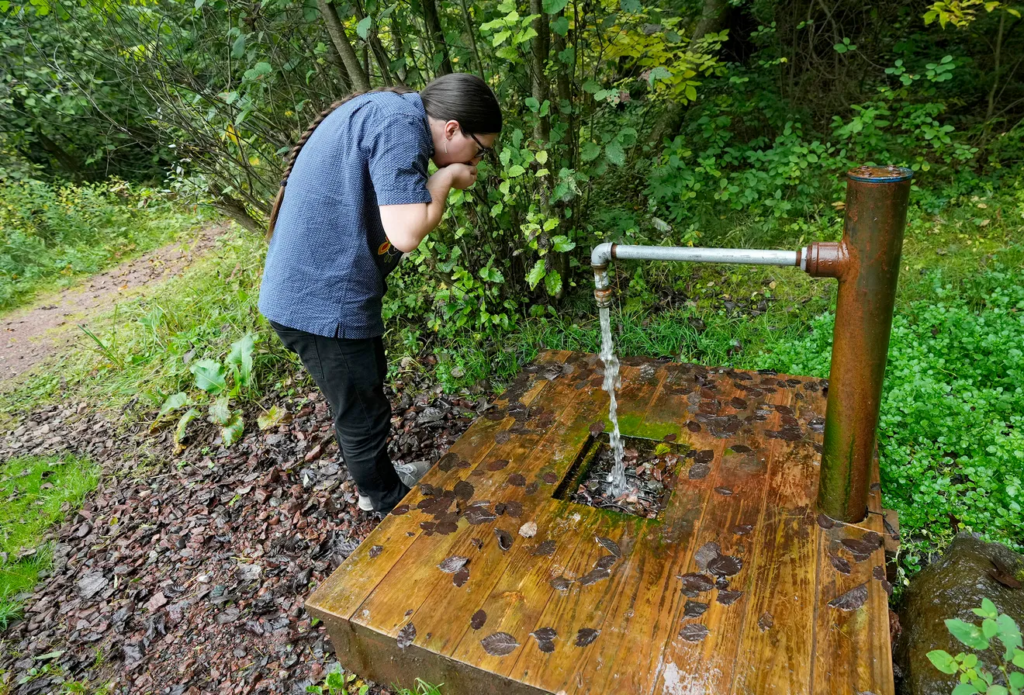
Cultural Perspectives
As a social worker we are encouraged to learn and respect different cultures around the world. Especially being in America we are a country that has always been very diverse culturally. Many cultures view water as significant among their traditions, rituals, and daily lives. In some cultures, water is revered as sacred, symbolizing purity, renewal and life itself. For example Hinduism, the Ganges River is considered holy and worshipped as the goddess Ganga. Also the Indigenous communities often have deep spiritual connections to water bodies, viewing them as sacred sources of sustenance and spirituality. Exploring these cultural perspectives helps children as well in understanding the rich diversity of beliefs and traditions associated with water. Ojibwe teachings say that “water is life”

A member of Red Cliff Band for Lake Superior Ojibwe drinking water from a well at Prentice Park.
Environmental Education
As a social worker helping the community to prosper is one of the fundamental guidelines to success. Teaching children and young adults about water conservation and pollution prevention is crucial for fostering environmental knowledge everyday. In example in fostering this kind of information could be activities such as water audits, where children assess their water usage at home or school, or young adults comparing their water bills to usage. Raising awareness with activities such as these can help promote the importance of conserving water. Additionally, hands-on projects such as rain barrels or creating mini wetlands can demonstrate the impact of human actions on water quality and quantity.

Health
Access to clean water and proper sanitation facilities is essential for public health. It is an important obstacle for social workers to help advocate for communities to have clean water and proper sanitation facilities along with the education to help themselves. Educating children about the importance of handwashing with soap, using safe drinking water sources, and practicing good hygiene habits can help prevent waterborne disease like diarrhea and cholera. It is important to keep up with educational seminars and activities in a classroom for all members of society to learn about water cycle, pollution, and the importance of conservation.
Community Progress
Community resilience is about the ability of a community to effectively respond to and recover from adversity, including water-related challenges such as floods, droughts, or pollution incidents. Resilience includes investing in resilient infrastructure and preparedness measures can help communities better withstand water- related hazards. This includes building flood defenses, upgrading water supply systems, and implementing early warning systems for natural disasters. By being proactive and advocating for communities we can address vulnerabilities and strengthening infrastructure, communities can reduce the impact of water related emergencies. We have personally seen what can lay ahead in the wake of emergencies like flooding can cause to a community. We had seen devastating results from not being prepared to natural disasters such as Hurricane Katrina. One of the most horrific disasters in American history and a lot of it had to do with poor planning, lack of leadership, participation, transparency, accountability, and lack of acknowledgement to the threats.

Global Water
Water makes up for approximately 71% of the Earth’s surface. Therefore water connects the world across borders and continents therefore we must treat water safety as a global matter. Social workers can introduce children to international initiatives like the United Nations Water for Life Decade and World Water Forum, where countries come together to address water-related challenges. Learning more about achieving clean water and sanitation goals for a sense of global freedom and responsibility for everyone that we can pass safely down to future generations.

Child Rights and Fairness
To uphold child rights and promote equity in access to water, it is essential to prioritize the needs of children in water management and policy-making processes. This includes ensuring that water and sanitation services are affordable, accessible, and of high quality for all children, regardless of their socioeconomic status or geographic location. It also involves addressing underlying factors such as poverty, discrimination, and lack of infrastructure that contribute to water insecurity and inequity. By prioritizing child rights and equity in water management efforts, we can create a more inclusive and sustainable world where every child has the opportunity to thrive and reach their full potential.

Resources
https://www.weforum.org/agenda/2023/03/un-2023-water-conference-experts-explain/
Comments
2 responses to “The Meaning Behind Global Water”
Hey Jacquelyn,
I found your blog super interesting! The importance of access to water is highly understated. Do you know of any resources in your area that help provide access to clean water or that work on initiatives that help make access to clean water easier?
Ariel
Hi Jacquelyn,
I enjoyed reading your blog and learned a lot! The importance of having access to clean water is something that I don’t hear about often. I will say that the numbers provided in the image you included are jarring – 1.6 billion people will lack safely managed drinking water by 2030 if we keep up with current rates. That’s only 6 years away, I’m stunned that I don’t see more advocacy efforts regarding this issue – however, this may be due to my ignorance of the situation. I’m happy I decided to read your blog because I will try to do my research as well. What do you think is the best way to help?
Lastly, I appreciate that you included how water is important/sacred when it comes to certain traditions, cultures, and religions. I’m Ojibwe and I loved that you included a piece of information regarding the teachings of water.